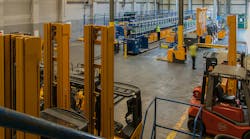Winning Strategies: Building Long-Term Relationships
Engineering is about more than building better products.Knowing the customer’s process and business plan is now as important tosuccess as the hardware.
by Clyde E. Witt, executive editor
In today’s business world, companies come and go likesummer thunderstorms. It might seem hard to envision an ongoing businessrelationship established 90 years ago, especially when the customer was yourfirst customer on the books!
In October 1911, Alvey received its first order for agravity conveyor from Anheuser-Busch. The yellowing pages of the order book,proudly displayed in the Alvey offices, indicate the second order it recordedwas also from Anheuser-Busch. Over the years many orders followed. Alvey and Anheuser-Busch,both St. Louis companies, have partnered, cooperated, created and installed avariety of machines. Anheuser-Busch currently has in service 164 of the 186palletizers it purchased from Alvey. A keystone of this long-term businessrelationship has been engineering. The roles of engineers for both companieshave changed, as have the personalities. But at the heart of this 90-yearassociation has been a basic truth: Performance for both companies has beenbased on more than the products they required or offered.
“Long-term relationships and success arise through,and are based on, need,” says Al Litteken, vice president, corporateengineering, Anheuser-Busch. Litteken has served with Anheuser-Busch for morethan 30 years and has seen changes in product, process and personalities— things he refers to as the glue that holds a relationship together. Hehas also seen the focus of engineering change from a concentration on theproduct (machinery needed to do a specific job) to a wider vision encompassingthe importance of the overall process. Technical skills will always be important for an engineer, but now thereare other things to consider. The Alvey/Anheuser-Busch relationship hassurvived because the cultures of the two companies were known to each other andrespected by both parties. Honesty has been a driving principle with bothcompanies.
“Companies have to be up front with each other —on all levels of management and engineering,” says Litteken. “Ifthere’s trouble out on the line, you have to talk it out and work it out.You have to be prepared to handle adversity as well as success.”
Frank Pellegrino, vice president, machine products, Alvey,echoes Litteken’s comment. “We’ve known when we’ve hadissues with Anheuser-Busch,” he says with a smile. “Butthey’re always fair and give us the opportunity to address thoseissues.”
Another thing that has kept Alvey and Anheuser-Busch workingtogether has been Alvey’s reliance on its engineers as problem solvers,prepared to take on the challenge of a customer’s problem.
“Engineering is at the heart of any new business weseek,” says Pellegrino. “We like to work with technically strongcompanies, not companies that view palletizers or other material handlingequipment as commodities.”
Ken Thouvenot, vice president, project management andmarketing, Alvey, says by working with companies that have a strong engineeringfocus, the vendor can do the customer a service. “Customers recognize ourperspective on the evolutionary aspect of [material handling] equipment.”
Collaboration means cooperation
As the role of the engineer focuses more on the entireprocess, the engineer has to know his customer’s business. Certainly, inthe end, the customer has the final say, but collaboration between the customerand vendor results in a win for all parties.
“Today,” says Litteken, “we look atbringing together all the appropriate players from the beginning of the processso that we get the expertise and important elements up front.”
Collaboration means shared responsibility to these twocompanies. Engineers working together can discuss quality, time schedules,costs and goals. To do this, engineers have to be able to translate generalbusiness practices as well as the customer’s business plan.
For example, what the vendor offers as standard equipment,the customer might not need or want. “The engineer is the enabler ofwhere we, as a company, want to go,” says Litteken. He notes thatachieving this is not always easy. The engineering skills must be complementedby communication skills.
“Communication has always been critical,” saysLitteken, “because an engineer has to be able to explain what thecustomer’s needs and desires are on all levels.”
Success of these two firms has also been, in part, theability of both parties to understand and explain the needs of Anheuser-Buschdown to a project level. It’s easy to say the company might want toexport more beer, but knowing the role of all the players required to achievethat goal, without trying to modify anyone’s behavior, is a skill anengineer has to learn.
Litteken says that Anheuser-Busch has never been an earlyadopter of new technology. A controlled approach using proven technology hasserved it well over the years. “We’ve relied on the engineers atAlvey to bring us equipment that has met a generally accepted level ofperformance,” he says. “We’re willing to be innovative if theend result warrants the change.”
Anheuser-Busch also relies on Alvey to use components ofother world-class vendors. “For example,” says Litteken, “werely on them for changes in automation or programming standards, and theyalways have in mind the goal we are trying to achieve.”
Pellegrino says one such effort just beginning withAnheuser-Busch (and might eventually be rolled out to its other customers) isthe concept of plug-and-play.
“We want to design and build equipment for thecustomer that can be more quickly installed when it gets to its point ofservice, be that a brewery or distribution center,” says Pellegrino.
Alvey’s engineers are working with more modularcomponents in electrical controls, for example, that will make fieldinstallation and service faster. Thouvenot adds that this is done withcooperative efforts on the part of engineers from both companies. “Wemake evaluations on engineering changes at all levels and test run theequipment in our plant before it goes to the field.”
Action Points for Engineers
Based on the experience of Alvey and Anheuser-Busch,here’s a brief list of what it takes, beyond conventional education, tocreate a winning strategy for engineers:
• Honesty and integrity;
• Listening to what customer is saying;
• Consistency in relationships with customer;
• Communications skills, written and oral;
• Instilling confidence in customer;
• Understanding dynamics and objectives of theproject;
• Being non-argumentative (your role is defined by thecustomer);
• Developing a network of people;
• Developing a passion for meeting company objectives;
• Knowing the role of all the players;
• Maintaining discipline and order;
• Knowing the customer’s company culture.
As a final suggestion, Al Litteken, vice president,corporate engineering, Anheuser-Busch, says personal relationships and findingcommonality between vendors and customers is important, but don’t rely onpersonal relationships to get the job done.


